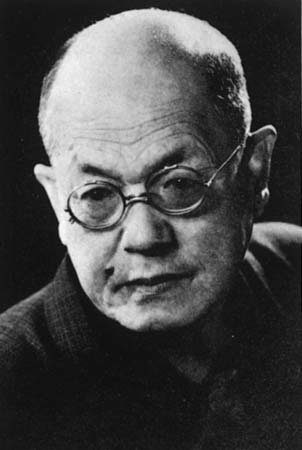Mushanokōji Saneatsu
Japanese writer and painter
Mushanokōji also spelled Mushakōji
born May 12, 1885, Tokyo, Japan
died April 9, 1976, Tokyo
 Japanese writer and painter noted for a lifelong philosophy of humanistic optimism.
Japanese writer and painter noted for a lifelong philosophy of humanistic optimism.The eighth child of an aristocratic family, Mushanokōji went to the Peers School and entered Tokyo Imperial University (now University of Tokyo) in 1906. He left without graduating to join his writer friends Shiga Naoya, Arishima Takeo, and Satomi Ton in founding the influential literary journal Shirakaba (“White Birch”). His reading of Leo Tolstoy and the Bible influenced the development of his humanitarian ideology. His early writings, of which Omedetaki hito (1911; “The Good-Natured Person”) is an example, are characterized by a bursting self-confidence. He was praised by the novelist Akutagawa Ryūnosuke for having “opened a window” to let light into a literary world dominated by dreary naturalist writing. He was the author of Ai to shi (1939; Love and Death), Aiyoku (1926; The Passion), and plays such as Aru katei (1910; A Family Affair), Washi mo shirani (1914; I Don't Know Either), and Daruma (Bodhidharma, 1962). He also wrote poetry. Mushanokōji bought land in southern Japan and in 1918 founded Atarashiki Mura (“New Village”), an experiment in communal living that ultimately failed. In later years he turned to painting but continued to make pronouncements affirming his optimism and his faith in humanity.
- University of Perugia
- University of Pittsburgh
- University of Poitiers
- University of Pretoria
- University of Rhode Island
- University of Richmond
- University of Rochester
- University of Rome
- University of Saint Andrews
- University of Salamanca
- University of Salerno
- University of San Francisco
- University of Sevilla
- University of Siena
- University of South Carolina
- University of South Dakota
- University of Southern California
- University of Southern Mississippi
- University of Sydney
- University of Tennessee
- University of Texas
- University of the District of Columbia
- University of the Pacific
- University of the Punjab
- University of Tokyo